
 Everyone always wants to know the writer’s writing origins, when for many of us we can’t recall the first time we scratched out a story. Was it a moment of inspiration, they want to know, a story we’d run across that needed our personal improvement? Or maybe we had somehow leaped over childhood development itself and landed in the middle of our search for identity only to discover that damn it, we were writers.
Everyone always wants to know the writer’s writing origins, when for many of us we can’t recall the first time we scratched out a story. Was it a moment of inspiration, they want to know, a story we’d run across that needed our personal improvement? Or maybe we had somehow leaped over childhood development itself and landed in the middle of our search for identity only to discover that damn it, we were writers.
I don’t remember when I thought of myself as a writer, even if I know I bundled up in the front room of my parents house because it was cold enough to see my breath, and I banged away on a towering Royal typewriter, feeling every carriage return as small progress. But my writing genesis is far less interesting to me than its trajectory. I had no idea, making up tales about natural disasters and families and sea monsters, that I’d come to have certain inalienable opinions about my work thirty-plus years later. I write with purpose beyond that of simply selling my work””which don’t get me wrong, is a great goal, fellow authors””I write because there were books I needed in my youth and early adulthood that didn’t exist. I write to fill in at least a few of the gaps. I write for myself, of course, and sometimes I’m writing for one other person who will read the thing and send me a Facebook message saying they’d never seen themselves in a story before mine. I am so lucky to get the opportunity to write for even a few others who will find it resonant.
A professor friend of mine who is rather brilliant in many regards was almost boastful with me last week by declaring that she simply doesn’t read novels. The novel is a product of The Enlightenment, she said, all about a kind of egotism between a luxuriating individual (presumably because they have the time to read) and a narrative that centers their being through the protagonist or movement of the plot. It’s the very act of finding oneself in the text that she found so distasteful. But I ask, when do Americans not seek themselves in their lives? We are told to “find” careers that we love, we buy our sofas with our own comfort in mind, we make friends based on common interests and with the expectation that they will understand us. While it is useful to inquire into our relationship to literature, why only do this to literature and not everything in culture? And why is the best move to act like literature isn’t there?
I would rather engage the process of reading and writing, of authorship and ideology. My ponderous process of writing has led me through many questions about narrative itself and the late-capitalist products that support narrative, like novels, blogs, Internet free-for-alls of visual productions like House of Cards. I return again and again to the production gaps””whose stories aren’t being told, which communities aren’t heralded in the publishing industry, in Hollywood, in New York City””and I revisit the questions of our newest generation of readers. Yes, stories should destabilize the oversimplified identification with the protagonist. Good writing should push those boundaries, as well as resisting the expectations we have for form, genre, literary merit, and popularity. Great writing should speak to readers who have never before felt spoken to, who have before that latest moment always had to wrap themselves around the writing in order to engage the text.
I thought nothing about any of this when I first sat down in my childhood, even if the kinetic energy of these questions was always at my fingertips. Who I was in my earliest stages of writing was not very interesting. What I try to achieve with my writing today however, fascinates me. I take that as a good sign I am headed in the right direction.
BIO: Everett Maroon is a memoirist, humorist, pop culture commentator, and fiction writer. He has a B.A. in English from Syracuse University and is a member of the Pacific Northwest Writer’s Association and was a finalist in their 2010 literary contest for memoir. Everett is the author of a memoir, Bumbling into Body Hair, and a young adult novel, The Unintentional Time Traveler, both published by Booktrope Editions. Everett blogs at transplantportation.com.
Want to write your own guest post? Here’s the guidelines.
Enjoy this writing advice and want more content like it? Check out the classes Cat gives via the Rambo Academy for Wayward Writers, which offers both on-demand and live online writing classes for fantasy and science fiction writers from Cat and other authors, including Ann Leckie, Seanan McGuire, Fran Wilde and other talents! All classes include three free slots.
...
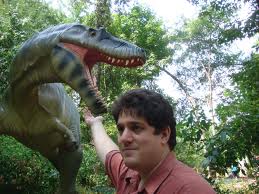 The second-most interesting thing about writing for video games is that odds are, the bulk of the writing that you’ll be doing will have very little to do with the “main” plot and its showier expressions. Yes, there is dialog to write and there are cut scenes to script and they are shiny and sexy and cool, but the thing is, a player’s only going to run across those lines and those scenes once as they advance through a game’s storyline. On the other hand, if they’re playing, say, a first person shooter, they’re going to encounter the so-called systemic dialog about shooting (and getting shot, and needing to reload, and needing to get the hell out of the way of an incoming grenade) rather more frequently than that. And, that in turn, means that you’re going to be spending a lot of time working on those lines, and generating a lot of them. You’re also going to be writing things like story documents, and character writeups, and team documents, and a dozen other things that aren’t the sexy bits with explosions that everyone thinks of when they think of game writing.
The second-most interesting thing about writing for video games is that odds are, the bulk of the writing that you’ll be doing will have very little to do with the “main” plot and its showier expressions. Yes, there is dialog to write and there are cut scenes to script and they are shiny and sexy and cool, but the thing is, a player’s only going to run across those lines and those scenes once as they advance through a game’s storyline. On the other hand, if they’re playing, say, a first person shooter, they’re going to encounter the so-called systemic dialog about shooting (and getting shot, and needing to reload, and needing to get the hell out of the way of an incoming grenade) rather more frequently than that. And, that in turn, means that you’re going to be spending a lot of time working on those lines, and generating a lot of them. You’re also going to be writing things like story documents, and character writeups, and team documents, and a dozen other things that aren’t the sexy bits with explosions that everyone thinks of when they think of game writing.
And that’s perfectly cool. Because those aspects of the gig require just as much craft and care as the more obvious ones, which means developing a whole new set of tools to make sure you get them right. Don’t believe me? Then go play a game where the systemic stuff didn’t get that tender loving care – where they didn’t produce enough variants so you hear the same lines coming from dozens of different enemies who probably shouldn’t be comparing notes with one another – and see if that starts getting annoying after a while. Better yet, find a game with one jarringly out of place systemic line and see if that doesn’t turn into the equivalent of nails on a chalkboard long before you’ve picked up all of the game’s achievements. (Trust me. I was kind of responsible for one of those.)
So, yes. There’s an awful lot of game writing that most people don’t really think about that’s necessary and intricate and hard work, and if you’re good at that you’re worth your weight in gold.
But that’s the second-most interesting thing. The first is that you’re not actually writing the story. Your protagonist is not the hero. And your version of how things are going to happen is going to crumble in the face of an irresistible force: the player.
Because in games, the player is the hero. It’s the player who makes every decision so that their particular journey through the game is unique to them. Even the little stuff – deciding when to reload or change garments or duck instead of sprinting – personalizes their experience in a way that defies the cast-in-stone progression of other narrative forms. Which means that as a game writer, you’re writing the stuff that the player turns into the story through their interaction with it. The wittiest dialog, the coolest cut scene, the most interesting plot twist – they all sit there, inert, until activated by the player’s interaction with them. Then and only then do they become part of that player’s story, a story that inevitably starts with the word “I” (and not “Lara Croft or “Sam Fisher” or “Pac-Man”) when it is told to friends later.
That’s a hard thing to grasp sometimes. The urge is to want to tell our stories, to tweak the timing and hone the experience so that everything’s sparkling and perfect and immutable. But that doesn’t work in a space where players are the reason the whole shebang exists, and while you may want your narrative elements to draw them forward, forcing them to do the same is liable to get some pushback.
And make no mistake, game players do love their story. Look at the uproar over the ending of Mass Effect 3 – that was about player investment in game characters and story,. Look at the love for games as wildly diverse as Gone Home and The Last of Us and Kentucky Route Zero and the utterly insane but brilliant DLC Gearbox put out for Borderlands 2. The writing in all of these games is something players want to experience; they just want to experience it in a way that makes it theirs, something they did instead of something they read or heard or watched.
And this is so much of what makes writing for games fun. It’s seeing that moment when the player inhabits your words, picks them up and makes them their own, that makes the crunches and the meetings and the endless, endless iterations of “Arrgh, he shot me” more than worthwhile.
Which reminds me, there’s a third really interesting thing about writing for video games. But that’s another story entirely.
Bio: Writer, game designer and cad, Richard Dansky was named one of the Top 20 videogame writers in the world in 2009 by Gamasutra. His work includes bestselling games such as Tom Clancy’s Splinter Cell: Conviction, Far Cry, Tom Clancy’s Rainbow Six 3, Outland, and Tom Clancy’s Splinter Cell: Blacklist. He has published six novels and the short fiction collection Snowbird Gothic, and is currently hard at work as the developer for the 20th Anniversary Edition of classic tabletop RPG Wraith: The Oblivion. Richard lives in North Carolina with his wife, statistician and blogger Melinda Thielbar, and their amorphously large collections of books and single malt whiskys.
Enjoy this writing advice and want more content like it? Check out the classes Cat gives via the Rambo Academy for Wayward Writers, which offers both on-demand and live online writing classes for fantasy and science fiction writers from Cat and other authors, including Ann Leckie, Seanan McGuire, Fran Wilde and other talents! All classes include three free slots.
If you’re an author or other fantasy and science fiction creative, and want to do a guest blog post, please check out the guest blog post guidelines.
...

Reading makes you smarter. Let’s go ahead and assert that as fact. Research actually indicates that there is a direct correlation between reading and intelligence. For that reason alone, you should be reading fantasy.
Beyond that however, what’s so special about reading fantasy, specifically? And how does it make you smarter?
By experiencing different worlds and living life through the eyes of another, it makes us more imaginative and aware. It brings inspiration and shapes our realities. Think of the intelligence you would gain if you could literally live other people’s lives – the experiences of hundreds of others, accessible for you to see and learn from. Reading fantasy actually affords you that ability. And the mythical and magical elements involved make it that much more fun along the way.
So, here they are. 4 reasons why reading fantasy makes you smarter:
Reading fantasy”¦
1. Cultivates imagination
Perhaps the biggest thing to be had from reading fantasy is the cultivating of the imagination. The power of the imagination cannot be understated. It opens the door to creativity and passion, as well as innovation and invention. These outcomes result in a world far more interesting than simple black and whites, yes and no’s. They are the keys to unlocking an infinity of as-of-yet undiscovered combinations and results. There is plenty of scientific evidence on why imagination makes you smarter, but try it for yourself! Who knows what you might come up with?
2. Makes you more aware
Those who cannot imagine consequences are doomed to discover them. Reading fantasy allows you to gain an extra perspective on life, which leads to increases in awareness, and greater awareness only leads to intelligence. When you read fantasy, you observe natural cause and effect relationships, even within stories of a fantastic nature. Seeing this cause and effect relationships allows you to become more adept at living with such consequences in mind, and overall, make you a smarter person.
3. Leads to inspiration
Inspiration can come from anywhere, but it often comes a lot quicker when you immerse yourself in that area of interest you find yourself pursuing. If you want to be a writer, you need to read a lot and write a lot. If you’re a musician, you need to practice. It is only first through the rigidity of discipline that the fluidity of genius finds its roots. Fix that discipline of reading fantasy to find your genius in inspiration. In his book, On Writing, Stephen King writes, “Your job is to make sure the muse knows where you’re going to be every day from nine ’til noon. Or seven ’til three. If he does know, I assure you that sooner or later he’ll start showing up.” The fluidity of genius finds its roots.
4. Shapes your reality
Let’s face it: At times, reality can be dull. This is especially true when you have a set routine throughout your week. Fantasy allows you to jump out of that routine and into a completely different world. Who wouldn’t take advantage of this varied range of experiences to be had?
A word of warning here: You don’t want to live completely in a fantasy world either though. Like everything, there’s a balance. Make sure that you stay grounded. Fantasy is fun, interesting, exciting, and many more things, but it’s still fantasy. As long as you keep that in mind, you’ll be all right.
So there it is. Reading fantasy not only makes you smarter, but it makes you a better person overall. So get out there, find a book, and take advantage!
Find J.T. Gill at his website or on Twitter as @jt3_gill.
Want to write your own guest post? Here’s the guidelines.
#sfwapro
Enjoy this writing advice and want more content like it? Check out the classes Cat gives via the Rambo Academy for Wayward Writers, which offers both on-demand and live online writing classes for fantasy and science fiction writers from Cat and other authors, including Ann Leckie, Seanan McGuire, Fran Wilde and other talents! All classes include three free slots.
...
 I grew up in a time where we were taught to conform. If you want to write like the Greats, then study the Greats. Creative Writing professors often told us to choose a writer we admired and then write a poem or short story copying their style.
I grew up in a time where we were taught to conform. If you want to write like the Greats, then study the Greats. Creative Writing professors often told us to choose a writer we admired and then write a poem or short story copying their style.
It accomplished what it set out to do, I suppose. We became more familiar with the writers we studied. We could pick out nuance and detail that were unfamiliar before. At the end of class, we emerged with a greater understanding of Faulkner, Frost, and Dostoevsky.
The only problem is that the woman sitting to the left of me wasn’t Faulkner. I wasn’t Frost. And the man in the front row never wanted to be Dostoevsky.
Authors have their own unique voices, and it’s a shame not to use them. Writers write because they care. They have something to say. They want to spread a message or they want to chat with their readers. They want to tell you things. Describe things. How is an author supposed to accurately express themselves when they have, in essence, learned to speak using somebody else’s voice?
Enough of that. You are YOU. The greatest thing you can bring to the literary table is yourself. Faulkner has already taken his seat. Do you know who should be sitting in the chair next to him? You. You have wonderful things to discuss.
Here are a few exercises and ideas that can help you find your own unique writing voice.
1. Write yourself a letter.
It doesn’t matter what kind of letter. What are you saying? What words do you use? Are you formal or folksy? Do you speak to yourself like a friend or is there a respectful distance there?
This exercise helps in a couple of ways. First off, it forces you to sit down and write, which is the first step. It’s also not meant to be daunting. Who cares about your literary success more than you? Nobody, that’s who. So write yourself a letter. Don’t judge yourself. This is a time to see what flows from your pen (or computer) when nobody is looking.
2. Record yourself talking about your upcoming project.
You can do it via audio or video, but the idea is similar to letter writing. What types of phrases do you use? Are you excited about the project? Now record yourself discussing a different project, preferably one that is in a dissimilar vein than your first project. Project #2 has a different ambiance, yes? Different subject matter? How do you sound while discussing it? Are your words the same?
3. Write a list of your favorite words.
Why are these your favorite? What makes them part of your vocabulary?
I had a member of my writer’s group say that he could always detect my work because I would use the words “broken” and “exquisite” quite often. And while this made me laugh, I realized that I do have choice words, and they convey exactly what I want to say. I’m not saying to use repetitive words in order to form voice, but to keep a lookout on your unique word set. These choices make you the writer you are. They’ll give you a hint on what your voice sounds like.
4.Realize that you might have more than one voice.
We discussed that one author doesn’t necessarily sound like another. And you might not necessarily sound like yourself all of the time. Perhaps that doesn’t make sense, but let’s go back to step 2, where you recorded yourself discussing two different projects. Two diverse projects might have two separate voices.
I realized that I have two distinct voices. One is a smart aleck type of voice with sarcasm and swagger, and it usually comes out while writing first person. I also have an elegant, much more ephemeral voice that uses higher and more lyrical language. This tends to come out when I’m writing in third person, and this voice is what I’m more noted for. But until I figured this out, I found it confusing. I wasn’t sure exactly why I sounded one way for one project and so different for another. I just wrote what I felt like writing, but other writers discussed the concept of “voice” so much that I became insecure and made the effort to figure mine out.
5. Write. Write a lot.
You won’t discover your literary voice in any other way. These suggestions can help, but we all know the only way to become a better, more informed writer is to read and write. But by being able to identify your literary voice, you’ll be able to more easily convey the sense of your work to others. This will help immensely when pitching your work, and will hopefully lead to even more opportunities for you.
Write on, my friends.
Bio: Mercedes M. Yardley is a dark fantastic who wears red lipstick and poisonous flowers in her hair. She is the author of Beautiful Sorrows, Apocalyptic Montessa and Nuclear Lulu: A Tale of Atomic Love, Nameless, and her latest release, Pretty Little Dead Girls: A Novel of Murder and Whimsy, from Ragnarok Publications. Mercedes lives and works in Sin City, and you can reach her at www.mercedesyardley.com.
#sfwapro
Want to write your own guest post? Here’s the guidelines.
Enjoy this writing advice and want more content like it? Check out the classes Cat gives via the Rambo Academy for Wayward Writers, which offers both on-demand and live online writing classes for fantasy and science fiction writers from Cat and other authors, including Ann Leckie, Seanan McGuire, Fran Wilde and other talents! All classes include three free slots.
...
Is Canada’s fascination with zombies the death knell of undead chic?
Good day, eh? And greetings from the Great White North. It’s great to be here on Cat Rambo’s blog to extoll the virtues of our great Canadian literary culture.
OUR GREAT LITERARY CULTURE

We’ve got some great writers up here in Canada, eh? Like, you guys probably think that Ernest Hemingway’s the best thing since sliced bacon. But a lot of people don’t know that old Ernie had the stuffing beat out of him by Canadian writer Morley Callaghan in a boxing match in Paris back in the 1920s. (So much for your Nobel prize there eh, Ernie?)
Speaking of Nobel prizes, I should mention Margaret Atwood. Now, Margaret’s a real good gal, eh? She can hold her beer and paddle a canoe with the best of us but she’s a pretty good writer, too. People say she should win a Nobel, but she’s been standing in line for so long now that they’ve lost interest in her (like we have with Prince Charles). But it doesn’t change the fact that she’s smart as a whip. About our great Canadian literary culture, she said:
“Canadians are forever taking the national pulse like doctors at a sickbed: the aim is not to see whether the patient will live well but simply whether he will live at all “¦ Our stories are likely to be tales not of those who made it but of those who made it back, from the awful experience — the North, the snowstorm, the sinking ship — that killed everyone else.” ““ SURVIVAL: A THEMATIC GUIDE TO CANADIAN LITERATURE, Chapter 1
Like I said, she’s clever. And she’s right! Even if she couldn’t have licked Ernest Hemingway in a boxing match in his prime (but I bet she could now, eh?)
...

North by Southwest is an anthology by ten writers. The tales are mainly set in Bristol and are an eclectic and unlikely series of journeys through landscape and story. These are all new stories, never before published, and show great variety. Here lies the strength of the book, showcasing as it does the work of the writers after a year or so of collaboration.
Bristol is a vibrant, creative city and the tales here are infused with that energy. Bristol has had such a great effect on transport through the ages ““ it’s an airplane city, a railway city, and a port city ““ so naturally such themes recur, as does the theme of “˜North’.
***
In February 2014, at a North Bristol Writers meeting I said, “We should write an anthology!” which was greeted by enthusiasm by all present. Writing the stories was the “˜easy’ part; how would we get it published?
A few friends had run successful Kickstarters and we toyed with the idea of crowdfunding but weren’t sure how to start. Then I had a chance meeting at a reading evening (the much missed Small Stories) with another writer ““ Amy Morse http://www.amymorse.co.uk/ who had just successfully funded her novel Solomon’s Secrets via a funding platform I’d not heard of ““ Fundsurfer, which is a Bristol based crowdfunding platform, very similar to Indiegogo and Kickstarter. I invited Amy along to a North Bristol Writers meeting to talk about her experience and after her talk we determined to use Fundsurfer. Mainly because Fundsurfer was local and the stories were mostly set locally.

We budgeted for Typesetting, Design, Printing and postage & packing then set up the Fundsurfer page. The most difficult bit was making the video, no-one in the group had any experience of making videos. We recorded a few hours of footage and in the end I only used the audio from it.
We launched the Fundsurfer at the end of October 2014 at BristolCon, who very generously donated several sets of tickets for the 2015 Con that we could use for pledge rewards, and set it to run for until mid-December.
Friends who’d had successful crowdfunding campaigns gave some great advice. The best piece of advice was “build the crowd, then the funding” so we had spent a while telling everyone we could think of that the book existed and needed funding. So that when we launched the Fundsurfer campaign a lot of people already knew about it.
I’ve mentioned a couple of rewards already and obviously the rewards and the levels are key to the success of the project. We started with a long list of about fifteen rewards but with the advice of “˜less is more’ from the Fundsurfer guys we whittled them down to seven. Apparently it’s like the way people choose wine, some will go for the bargain basement (but in fact we had very few go for the lowest reward level) some will go for the mid-range and some will go for the top range. The majority of people will go for the mid-range. So having a range of rewards is more important than having a variety of awards. We budgeted for a certain number of physical copies and worked out the likely number for P&P. P&P kills many crowdfunding campaigns & is something you need to give careful consideration to!
We got some nice publicity from Bristol 24/7 and a very entertaining “˜celebrity endorsement’ from local writer Jonathan L. Howard.
With 10 writers, an editor and an artist involved we thought that funding would work out if we could all get a few friends & family to pledge. It was still a nailbiting few weeks as the project slowly accumulated the funds; slower than I would have liked. We reached our funding goals a few days before the project was due to end and got pretty much what we asked for, getting just £62 over our goal.
Often it felt like all those times in school when you tried to get money out of people for doing a sponsored walk, or similar. We mainly sold it as a pre-order for the book, but potentially didn’t set expectations well enough, that once we had the funding the process of getting the book published would begin, and as we all know, everything in publishing takes a lot longer than you think. However the actual process has been very smooth, thanks to Tangent. All the funders have now received their eBook and the print book is imminent. We are looking to have a local launch and have started planning our next anthology.
Would I crowdfund again? It’s a very viable way to fund a project but it does rely totally on people’s goodwill and it is a lot of hard work. The amount of people who will “get round to it” is very large and there is an inevitable amount of nagging, which I didn’t like at all. However we were successful and it was the most equitable way of creating the book.
 Bio: Pete Sutton is a UK writer and blogger, one of the organisers of Bristol Festival of Literature and contributing editor to Far Horizons magazine . He is a contributor to the Naked Guide to Bristol and you can read his latest published story ““ The body in the lake in Fossil Lake 2 published by Sabledrake Enterprises.
Bio: Pete Sutton is a UK writer and blogger, one of the organisers of Bristol Festival of Literature and contributing editor to Far Horizons magazine . He is a contributor to the Naked Guide to Bristol and you can read his latest published story ““ The body in the lake in Fossil Lake 2 published by Sabledrake Enterprises.
Follow him on Twitter as @Suttope and read his blog here: http://brsbkblog.blogspot.co.uk/ & his website here: http://petewsutton.com/.
Want to write your own guest post? Here’s the guidelines.
#sfwapro
Enjoy this writing advice and want more content like it? Check out the classes Cat gives via the Rambo Academy for Wayward Writers, which offers both on-demand and live online writing classes for fantasy and science fiction writers from Cat and other authors, including Ann Leckie, Seanan McGuire, Fran Wilde and other talents! All classes include three free slots.
...
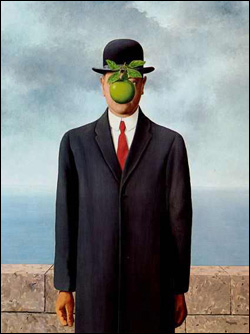
To begin with, great characters must seem real: not superheroes, not perfect, not omnipotent and certainly not omniscient. Sometimes they make a wrong decision. Sometimes they’re afraid or even petty. Sometimes they do stupid things. My own favorite character has a very serious problem with authority. Good characters, like real people, have flaws, and may even have serious or crippling ones. If your characters do have such flaws they will have an appeal to your reader that no heroic cardboard paladin could ever match. Readers have even been known to fall in love with tragically flawed characters.
Great characters have their own complex motivations. Even in fantasy tales of good versus evil, every significant character needs to have their own motivation for what they are doing. Whether it is love, duty, hate, revenge, lust, greed or atonement, the reader needs to know just what it is that motivates the character to do what they are doing. Whether told by backstory or brought out via conversation, each significant character’s motivation should be exposed in order to make them more interesting to the reader, and to get the reader more involved in the plot through the characters. Along with having their own motivation, every significant character should be in pursuit of something – victory, success, escape, money, fame, freedom or even just their next meal – and the reader should know what it is.
Great characters are not described in detail. Certainly the character’s general appearance and nature should be presented; but the details of the character should be spelled out by the character itself in the character’s motivations, actions and dialogue. Leaving the character as an essentially blank canvas to be filled in later by what the character does is far more effective than actually going into detail about them. Additionally, any details deliberately left out by the writer will be automatically filled in by the imagination of the reader, thus making for a more personal and more enjoyable reading experience. A writer can even use the sudden exposure of a previously-undisclosed facet of a character as an effective plot device.
Now that as an author you have created some great, human, flawed, motivated characters, what do you do with them? You ruin their lives. You do that by menacing or hurting them or someone (or something) they love, by putting them in harm’s way, by tormenting them, by making them suffer. Why? So the reader can see who they really are. As Dwight Moody famously said, “Character is what you are in the dark,” and when things are darkest for your characters is when the reader learns the most about them. Failure also helps with character development: how someone deals with failure is far more telling about them than how they deal with success ever is, both in fiction and in real life.
And, last but not least, have at least one character for everyone to sympathize with. By this I don’t necessarily mean to try to present one character in a way that is sympathetic to everyone; what I mean here is that given the totality of human nature, try to have enough variation in the characters that at least one of will be able to appeal to a reader no matter what the reader’s nature, worldview, philosophy, politics, or sexuality are. Yes, this is an argument for diversity in characters, but it’s not a political argument: there are readers out there of all types, and as a writer who wants to succeed you want your fiction to appeal to all of them, or as least as many as you possibly can.
Great characters make great fiction, so be sure to make great characters.
Bio: John Johnston III is a scientist, a fiction and non-fiction writer, a board vice chairman, a university faculty member, a member of Science Fiction and Fantasy Writers of America (as well as the chair of its Grievance Committee and a recipient of its highest honor), a lifelong baseball fan, a patriot, and a political independent. He thinks that personal websites are even more vain than requested bios and refuses to have one.
Want to write your own guest post? Here’s the guidelines.
#sfwapro
Enjoy this writing advice and want more content like it? Check out the classes Cat gives via the Rambo Academy for Wayward Writers, which offers both on-demand and live online writing classes for fantasy and science fiction writers from Cat and other authors, including Ann Leckie, Seanan McGuire, Fran Wilde and other talents! All classes include three free slots.
...
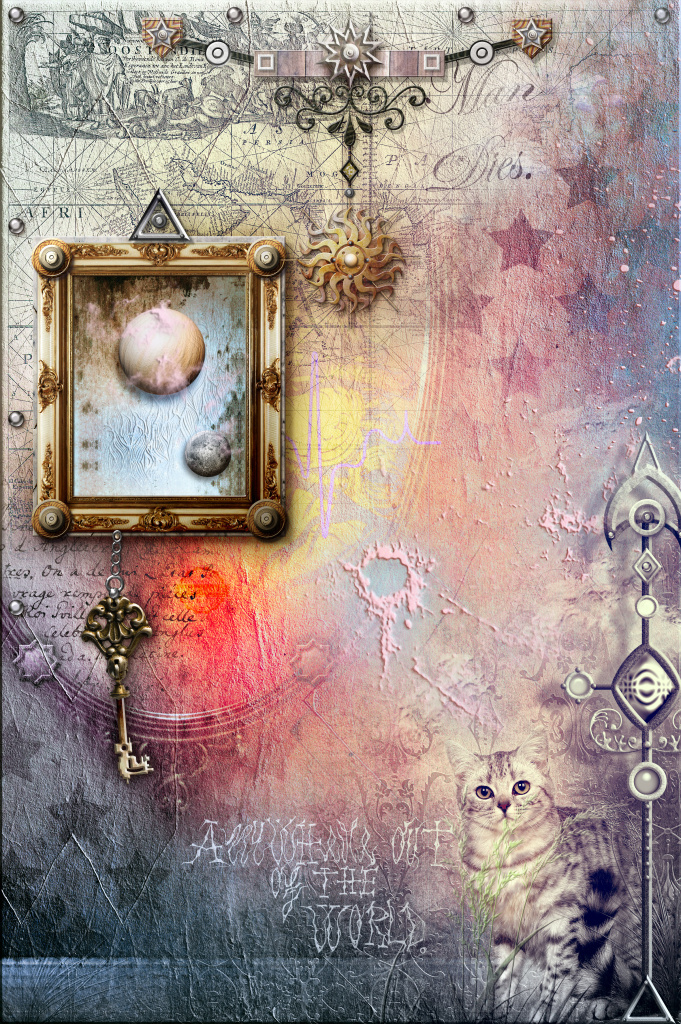
Last week, the guest posts were Kim Mainord with “Your Mileage May Vary”, Sandra M. Odell on fantasy podcasts, Ken Altabef on using Inuit mythology in his work, Rhonda Eudaly with “Writing is Only Glamourous Until This Face Appears,” and Raven Oak talked about “Linguistics in Fantasy — To Thee or Not to Thee”.
This week, we have John Johnston III musing on Fictional Characters, Pete Sutton will talk about succesffully crowdfunding an anthology, Jamie Mason will wax philosophical about Candadian zombies, Mercedes M. Yardley will discuss finding your literary voice, and to wrap up the week, J.T. Gill will tell you why reading fantasy makes you smarter. I’ll also be posting snippets from the sequel to Beasts of Tabat, which I’m working on right now, keeping you informed of any recent SFWA developments, and talking about point of view and being inside a character’s head. And finally — for online writing class news, either sign up for my mailing list at the bottom of this post, or keep checking this site.
What else is coming up in March and April? There’ll be some giveaways, including audio copies of my collection Eyes Like Sky and Coal and Moonlight, both hard and e-copies of my collections and the new novel, and some cool surprises. 🙂 You’ll also see “Documents of Tabat,” a number of small pieces of fiction, each of which ties into the book (they’re interstitial pieces from an earlier version of the novel), starting March 24 and continuing on weeks through April 21st. I’ll point you to the GoodReads giveaways when they come up, and at the end of the week, I’ll include a wrap-up of the various places I’ve guest posted and any places reviews or other mentions have occurred.
Some of you reading this have been with me since I first started writing stories set in this world; others are new to my words. Either way, I hope you’ll enjoy the novel that I’m finally getting the chance to lay before you, and I hope you’ll share some of the fun of the next couple of months.
#mc_embed_signup{background:#fff; clear:left; font:14px Helvetica,Arial,sans-serif; }
/* Add your own MailChimp form style overrides in your site stylesheet or in this style block.
We recommend moving this block and the preceding CSS link to the HEAD of your HTML file. */
...
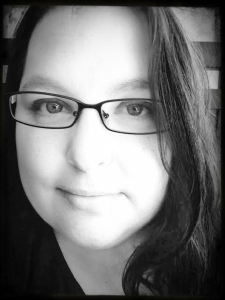
“Since your book’s technological advances place it during the Renaissance, your characters are wrong because they should be speaking like Shakespeare.”
Imagine my surprise when a friend and avid fantasy reader said this to me. I can’t remember the last time I met someone who believed that level of linguistic authenticity necessary in a fantasy world. While I love Shakespeare, if every fantasy novel I read was written with historically and culturally accurate language, I’d go mad. I don’t speak German any more than I speak Old English. Egad! Not even the people of Shakespeare’s time spoke like Shakespeare.
Imagine if The Lord of the Rings trilogy were written like this:
When Mister Bilbo Baggins of Bag Endeth announc’d that he wouldst shortly be
celebrating his eleventy-first birthday with a party of special
magnificence, thither was much talketh and excitement in Hobbiton.
Or like this:
Hwanne Dryhten Bilbo Baggins of Faetels Ende abeodan se he dulmúnus aer gebréfan beon he endleofan-fyrest ongean a gebéorscipe fram déore, þider beon fela acwepan end onwæcenness in Hobbiton.
Not so bad in Shakespeare’s tongue, but how enjoyable would the reading be in Old English?
...
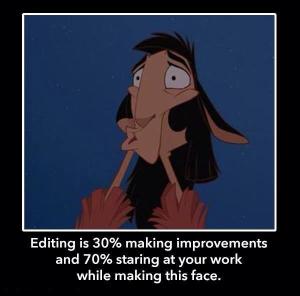
I thought long and hard about what to write about for this guest post opportunity. It’s like a bizarre Open Mic Night thing. Most of you don’t know me, but I can’t see my hecklers until it’s too late. So what to do? Try to be pithy? Try to be funny? Then the Meme Card came up on Facebook… Editing is 30% Improvement and 70% making this face. And so…is this thing on?
There’s a lot to learn when it comes to writing. You can do it for years and years and still learn stuff (in fact, my opinion is that you should always be learning stuff). I’ve done quite a bit of short story work for…a while…now, as well as working on braided novels and a couple of other formats. And while those are great, I’m currently doing the final edit on my novel before it’s published. And, well, FACE.
Doing a solo novel, especially for the first time, is so different from anything else I’ve ever done. First was the editorial phone call, which – while supportive also made me wonder what the heck I was thinking sending out this…thing. When the manuscript came back, I prepared for the red, but was a complete wuss about looking at it. Fortunately, there are whole pages that don’t have marks on them…and I’ll take what I can get – but still…ow. What made it better? Was hearing J. Kathleen Cheney say, “My editor made me rewrite the back half of my book…”
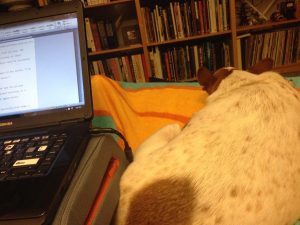
Now, I’m in the process of a strange hybrid editing…thing. I had my electronic file of the manuscript. I had the track changes file from Cheney, and the paper edits. Time to learn a new skill – which I did. I combined the two electronic files first and creating yet another file (in Word 2007 and up, it’s in the “Review” ribbon under “Compare” nifty little trick). Now, while I’m inputting my paper edits mostly from my publisher/editor, but some I made one my own, I also have Cheney’s notes. Made my life easier, but still…there’s the FACE.

So listen to your editors. They’re like Mothers. They know what they’re talking about, and they know what’s good for you, and just maybe help make that 30/70% ratio will skew higher.
Bio: Rhonda Eudaly lives in Arlington, Texas with her husband, and two dogs. She’s ventured into several industries and occupations for a wide variety of experience. She has a well-rounded publication history in both fiction and non-fiction many of which can be found on www.RhondaEudaly.com.
Want to write your own guest post? Here’s the guidelines.
#sfwapro
Enjoy this writing advice and want more content like it? Check out the classes Cat gives via the Rambo Academy for Wayward Writers, which offers both on-demand and live online writing classes for fantasy and science fiction writers from Cat and other authors, including Ann Leckie, Seanan McGuire, Fran Wilde and other talents! All classes include three free slots.
...
Want access to a lively community of writers and readers, free writing classes, co-working sessions, special speakers, weekly writing games, random pictures and MORE for as little as $2? Check out Cat’s Patreon campaign.

"(On the writing F&SF workshop) Wanted to crow and say thanks: the first story I wrote after taking your class was my very first sale. Coincidence? nah….thanks so much."



This site is protected by reCAPTCHA and the Google Privacy Policy and Terms of Service apply. This site is a participant in the Amazon Services LLC Associates Program, an affiliate advertising program designed to provide a means for sites to earn advertising fees by advertising and linking to Amazon.com.